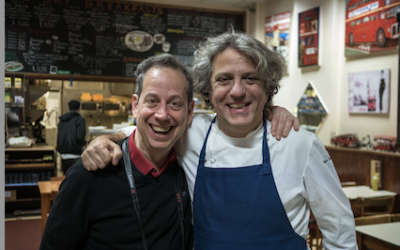 With the London launch of its Taste of Greece promotion The Greek National Tourism Organisation made it clear Tuesday 9 February 2010 was no day to be in Athens. A European capital already confronting a financial crisis was without two culinary giants who, ignoring unmistakable discrepancies in waistlines and hairlines, might be deemed the Heston Blumenthal and Pierre Hermé of modern Greek cuisine. Christoforos Peskias and Stelios Parliaros were at The Cookbook Cafe, doing cooking demos and helping to sell Greece, by which I mean they were promoting their country’s assets, not liquidating them. There was some occasional liquidizing and that was performed by the winner of the World Class Bartender 2009 competition, Aristotelis Papadopoulos of Thessaloniki, Greece.
With the London launch of its Taste of Greece promotion The Greek National Tourism Organisation made it clear Tuesday 9 February 2010 was no day to be in Athens. A European capital already confronting a financial crisis was without two culinary giants who, ignoring unmistakable discrepancies in waistlines and hairlines, might be deemed the Heston Blumenthal and Pierre Hermé of modern Greek cuisine. Christoforos Peskias and Stelios Parliaros were at The Cookbook Cafe, doing cooking demos and helping to sell Greece, by which I mean they were promoting their country’s assets, not liquidating them. There was some occasional liquidizing and that was performed by the winner of the World Class Bartender 2009 competition, Aristotelis Papadopoulos of Thessaloniki, Greece.
Anyone wanting to update prevailing notions of Greek dining or upset those who cling to them could find no better ambassadors. In London, Greek food is typically marginalised as either greasy taverna fare or folksy, rustic, grandmother’s cooking. (Don’t get me wrong: I love grandmother’s cooking as much as the next guy. It’s just that if I ate it every night I’d have to pay for two seats when riding the Piccadilly Line.) The Real Greek, London’s first and hopefully not its last sophisticated, contemporary Greek restaurant, did take a wider view, transporting diners beyond the realm of Greek salad and taramasalata, pastitsio and moussaka. But all that’s left of that endeavour is a chain of souvlaki restaurants. (Don’t get me wrong, I love souvlaki. It’s just that if I ate it every night I would be scattering statins and Gaviscon, rather than blueberries, on my morning porridge.)
 Champions of Greek food can perpetuate its humble image, too. During the Q&A at the Taste of Greece launch, Peskias was asked who his main influences were. He cited the celebrated chefs Raymond Blanc, Charlie Trotter and Ferran Adrià as role models. The jaded journalists in the audience were unimpressed; the Greek dignitaries, unmoved. Peskias faltered. He searched his mind for a fourth name. Tonia Buxton, the effervescent, voluptuous, Greek Cypriot presenter of Discovery Channel‘s My Greek Kitchen, called out a suggestion from the front row: what about your mother? Buxton spoke with passion about the love and cooking of Greek mothers. Most of the Hellenes in attendance shed tears into their yogurt martinis. (I wept too and my mother is Jewish-American.) Not Peskias. He stammered and wavered and then, summoning all his courage, looked Buxton directly in the cleavage: No, he told her, almost apologetically, his mother did not inspire him to become a chef.
Champions of Greek food can perpetuate its humble image, too. During the Q&A at the Taste of Greece launch, Peskias was asked who his main influences were. He cited the celebrated chefs Raymond Blanc, Charlie Trotter and Ferran Adrià as role models. The jaded journalists in the audience were unimpressed; the Greek dignitaries, unmoved. Peskias faltered. He searched his mind for a fourth name. Tonia Buxton, the effervescent, voluptuous, Greek Cypriot presenter of Discovery Channel‘s My Greek Kitchen, called out a suggestion from the front row: what about your mother? Buxton spoke with passion about the love and cooking of Greek mothers. Most of the Hellenes in attendance shed tears into their yogurt martinis. (I wept too and my mother is Jewish-American.) Not Peskias. He stammered and wavered and then, summoning all his courage, looked Buxton directly in the cleavage: No, he told her, almost apologetically, his mother did not inspire him to become a chef.
 As a deconstructionist, Peskias appears not to uphold tradition so much as tear it down. He reinvents the basic elements of the Greek kitchen, turning Feta to powder or tzatziki to foam, before reassembling them in modern forms familiar to the nose yet exotic to the eyes. At Taste of Greece he prepared pork belly souvlaki sous-vide, holding up the slow-and-low-cooked pork belly in its vacuum poach and then cutting it open to release a fountain of fatty cooking juices. The audience oohed and aahed out of either temptation or terror, it’s difficult to say: Souvlaki never looked like this.
As a deconstructionist, Peskias appears not to uphold tradition so much as tear it down. He reinvents the basic elements of the Greek kitchen, turning Feta to powder or tzatziki to foam, before reassembling them in modern forms familiar to the nose yet exotic to the eyes. At Taste of Greece he prepared pork belly souvlaki sous-vide, holding up the slow-and-low-cooked pork belly in its vacuum poach and then cutting it open to release a fountain of fatty cooking juices. The audience oohed and aahed out of either temptation or terror, it’s difficult to say: Souvlaki never looked like this.


 Stelios Parliaros is also a deconstructionist driven by the latest advances in food science. He lives by his instant-read digital thermometers. When you extend your hand to Parliaros you half expect him to take its temperature before he shakes it. In his hands olive oil, yogurt, Feta and mastic aren’t merely viable flavours in French patisserie and fine chocolates. They inspire revelations. I know: For my wedding party in 2005 Parliaros prepared a mastic vanilla mousse and served it in a figurative wedding cake consisting of 75 white Chinese soup spoons. The guests were visibly stirred or stupified, I can’t quite recall which.
Stelios Parliaros is also a deconstructionist driven by the latest advances in food science. He lives by his instant-read digital thermometers. When you extend your hand to Parliaros you half expect him to take its temperature before he shakes it. In his hands olive oil, yogurt, Feta and mastic aren’t merely viable flavours in French patisserie and fine chocolates. They inspire revelations. I know: For my wedding party in 2005 Parliaros prepared a mastic vanilla mousse and served it in a figurative wedding cake consisting of 75 white Chinese soup spoons. The guests were visibly stirred or stupified, I can’t quite recall which.

At Taste of Greece I asked Peskias and Parliaros if they were ever worried their inventiveness went too far, violating the essence of a classic dish or revered family custom. Peskias didn’t think so, providing the ingredients were indigenous to Greece. Rather than attacking the cooking of Greek mothers he felt like he was celebrating it. In his mind the best way to breathe life into something old and familiar was to revisit it. When you change the perception of a dish you invite its rediscovery. “Same taste,” he noted, “different experience.”




I saw this day announced last week and I wish I was in London for this.
Thanks for posting the update, will include in my greek food news round-up next week.
LOVE greek food. Growing up our neighbors were from Greece and we used to live for the days they would invite us to dinner!Moussaka, Tzatsiki, the list goes on!
So sorry to miss this. Parliaros and Peskias deserve world recognition. Why can’t someone invite them to London for more than a day?